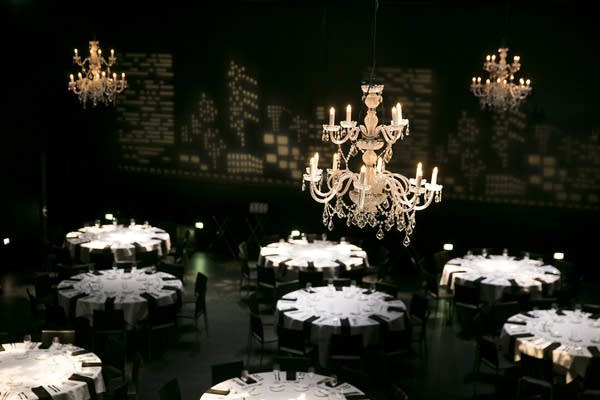Super Super Bowl economic impact? Depends who you ask

The Super Bowl festivities kicking into high gear today will provide an economic boost to the region. There's no disputing that. But how much of a boost is subject to both debate and variation.
Manny's Steakhouse at 9th and Marquette in downtown Minneapolis will be pretty packed this week. General manager Dave Wilson said he expects at least a 25 percent surge in bookings and sales.
"That kind of increase in business is absolutely super," he said.

The Guthrie — a mere three blocks from the U.S. Bank stadium — is doing well, too. Bookings were slower than expected but at this point most spaces at the Guthrie have been snapped up for the week, and managing director Jennifer Bielstein said the Guthrie has been able to boost its usual rental rates by about 25 percent.
Create a More Connected Minnesota
MPR News is your trusted resource for the news you need. With your support, MPR News brings accessible, courageous journalism and authentic conversation to everyone - free of paywalls and barriers. Your gift makes a difference.
"We're pleased with the events that are being held here, the exposure that we'll get, the rental fees that we'll be getting," she said.
Manny's and the Guthrie could be poster children for the economic boom Super Bowl promoters are promising — at a time that's typically slow for the local hospitality industry.
In a report done for the Twin Cities Super Bowl Host Committee, Rockport Analytics estimated that the game will bring 125,000 visitors to the metro area. They'll be shelling out for hotels, restaurants, corporate parties, concerts and more. Rockport managing director Ken McGill said they'll leave big bucks behind.
"You will have scored big," he said. "You get net incremental spending of $338 million."

But that spending won't be spread evenly.
The Campus Club at the University of Minnesota figured it would score a lot of event bookings. It's just a ten-minute light rail ride from U.S. Bank stadium, can accommodate 400 people and offers panoramic views of the stadium and downtown Minneapolis.
"And we ended up getting nothing," said Jennifer Hultman, the club's events and marketing manager.
"Nothing was a good fit. It was either too large or too small."
And that's the thing about Super Bowls. The economic boost may fall well short of the hype — both for individual businesses and the region as a whole.

Victor Matheson is a leading sports economist who has specialized in evaluating the big game's economic impact over time. He said that if the Twin Cities is like most past Super Bowl host cities there will be a big increase in economic activity ... "But that big increase is about $30 million to $130 million," he said. "Not something to sneeze at. But it's a fraction of the the sort of numbers that get thrown around normally."
Even if the big game brought the projected $340 million in new spending, that's a miniscule 0.14 percent of the total Twin Cities economy, and its far short of what Matheson said is the public cost to land and host the game.
"The main expense that Minneapolis has incurred for the Super Bowl is about $500 million in taxpayer expense for a new stadium," he said.
Critics of the stadium say that money could could have been put toward initiatives, such as education, that would provide a better payoff.
"This was not a high return investment," said Arthur Rolnick, senior fellow at the Humphrey School of Public Affairs at the University of Minnesota. "Poverty is a serious problem. Crime is a serious problem. A shortage of workers is a serious problem. What problem are you solving with the Super Bowl?"
There are the police, public works and others costs associated with the game, as well as whatever freebies the NFL received. The league asked host cities competing for the game to provide many things to the NFL free of charge, from advertising to cops who would fight ticket counterfeiting.
Super Bowl host committee spokeswoman Andrea Mokros said city taxpayers won't be on the hook for some costs, which could reach about $6 million. "We have an agreement with the city of Minneapolis to fund not only public works but law enforcement, and security costs over and above what would normally be incurred by the city," she said.
There may never be a full accounting of the net economic benefit of the Super Bowl. It's notoriously difficult to calculate, because even hundreds of millions of dollars in new spending are hard to track in a quarter trillion dollar regional economy. But economist Victor Matheson concludes "it appears most economic impact reports are 'padded' at least as well as the players on the field."
Correction (May 29, 2018): An earlier version of this story contained incorrect spellings of Victor Matheson's name.